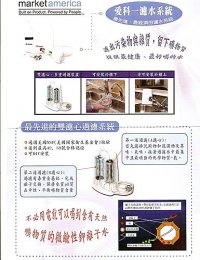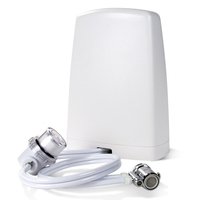
|
Healthy & Eco-Choice: PureH2O™ Water Filtration System -- 2009-08-12
PureH2OTM Water Filtration System features an exclusive dual-filter system installs in seconds and uses a combination of carbon filtration, ion exchange and sub-micron filtration to produce truly healthy, better-tasting water from your kitchen tap. Using the latest two-stage water filtration technology, the PureH2O Water Filtration System filters out a wider range of contaminants than other filters (see performance data sheet for specific contaminants filtered). The first cartridge filters out sediment, tiny microscopic particles, and chlorine taste and odor. The second cartridge features a complex ion exchange process that maintains the mineral balance of water while filtering out the lead. This supercharged water system also helps maintain healthy pH levels.
Municipal water supplies may not completely filter out all chemical contaminants. In fact, some chlorine taste and odor stays in after processing and ends up in the tap water you drink. PureH2O filters out the chlorine taste and bad odors, greatly improving the quality and clarity of your tap water. PureH2OTM, Because it's your water!
Benefits:
Product Specifications:
IMPORTANT: Do not use where water is microbiologically unsafe or with water of unknown quality, except that systems claiming cyst reduction may be used on water containing cysts.
Source : Safety-yp.com
|
如欲查詢更多產品資料,請與我們聯絡。 如欲查询更多产品资料,请与我们联络。 Should you need further information, please contact us. Email: info@safety-yp.com Tel: (852) 2838 3324
常見問題:
樽裝水與過濾水那個比較好?
雖然很多樽裝水的品質是好的,但保證其品質的規範或方法卻是幾乎沒有...基本上這是一個自我監督的行業。相對而言,製造家用淨水器的行業有著嚴格規範。製造商必須做詳盡的檢測並提出報告,以證實其產品能夠有效地提供高品質的飲用水。製造商也必須提交表明移除特定污染物的「性能證明資料表」,證明產品的功能;然而,要求製造樽裝水的公司表明品質的有關條例,卻是竟告闕如。
什麼是TDS?
TDS是「總溶解固體量」(Total Dissolved Solids)的縮寫,它是在水中溶解的固體物質總重量。在水中溶解的固體主要為鈣和鎂,不能以此作為測試污染物的依據。水的電導度測量(銷售逆滲透與蒸餾系統的公司通常會使用)只能粗估溶解固體量(通常是礦物質),不能顯示水質。以這些測試得出的水質報告相當偏頗,不足為凴。
氯有害嗎?
1908年,芝加哥的公共用水系統首次加入氯,為的是要消除飲用水引起的多種疾病,如霍亂、傷寒等。在此之前,許多大城市裡僅因傷寒造成的死亡率,就高達千分之一。採用加氯消毒的方式來處理城市供水系統,迄今已有100年,在公共衛生方面,獲得了一定的積極成效。在1970年代有人發現:加入水中的氯與植物、水藻等天然有機物結合後,會形成三鹵甲烷(加氯造成的副產品)。美國公共衛生期刊在1992年發表的一份研究報告表明,使用含氯水的人罹患某些癌症的幾率會增加15%至35%。此份報告還指出,使用含氯水沖涼也會對人造成危害。根據美國國家癌症研究院的評估,與不使用含氯水的人相比,使用含氯水的人罹患癌症的風險要高出93%。有關飲用含氯水的影響,已經爭辯了數十年。不過現在多數專家認爲,攝取飲用水的氯與加氯後的副產品會有相當風險。
為什麼有些區域的氯測試為陰性?
幾乎所有的城市自來水系統都含有一定濃度的氯。含氯濃度會因戶外溫度、季節、離自來水廠的距離和現在的使用狀況而有所不同。使用標準的OTO餘氯測試工具,在有些日子會無法測出氯含量,因為氯含量在不同的日期可能會有很大的變化。此外,有一些城市在特定時期使用氨作為消毒劑,為的是減少加氯造成的副產品。但如果水中不加氯,飲水傳染疾病的危險度就會大幅增加。在特定日子無法測試氯含量,並不表示不需要有效的家用濾水系統。
什麼是VOCs?
答:VOCs是「易揮發有機化合物」(Volatile Organic Chemicals)的縮寫。這是合成的化學物質,在較低溫度下可以汽化。VOCs通常在比水溫低許多的溫度下即可汽化。水中的大多數合成化學物,如殺蟲劑與除草劑,均屬VOCs。
儲存過濾水的最佳容器是什麼?
玻璃材質永遠都是首選;但是若不能使用玻璃材質容器,那麼高級聚碳酸酯材質便是最好的。底部回收三角圖示編號為 "1"的透明塑膠樽裝,例如Evian礦泉水及高品質樽裝水的樽裝,是儲存水的最佳選擇,因為它們釋放到水裡的塑膠成分是最少的。應該避免使用底部編號不是 "1"的半透明或有色樽裝,因為使用此類樽裝,就可能有更多的塑膠化學成分進到水裡。
P.O.E.總進水口濾水系統是否比桌上型濾水器這樣的P.O.U點置系統好?
P.O.U點置系統是迄今為止確保最佳品質用水的最佳方法,因為許多水中的污染物源於家中的管線,包括來自水管的鉛和氯乙烯。使用P.O.U點置系統淨水,你能在用水之前移除污染物,排除二次污染的可能。P.O.E.總進水口濾水系統有一定的除污功效,但卻無法取代P.O.U點置系統的功效。
磁處理水有什麼優點?
有些製造商宣稱磁處理水具有許多優點,但並未有任何可信的研究或報告,證明磁處理過的飲用水有任何可測量的優點。消費者對未經證實的宣稱不可輕信。
你怎能知道水裡是不是有污染物?
所有公共自來水系統都含有一定程度的有害化學物質,法規僅規定要定期測試約90項化學物質。社會上使用的化學品有75,000多種,每年新研發出的化學品有1,000多種。一年之中污染程度時常變化,因此要知道供水系統的實際污染程度是不可能的。
是不是有些人對於飲用水和沖涼水的化學物質比較敏感?
當然,幼兒與老人家受污染水的影響較大,因為免疫系統尚未發展完全或耐受度較低的原因,幼兒與老人家身體處理毒物的能力較低。
Frequently Asked Questions:
Is bottled water or filtered water better?
While much bottled water is of good quality, there are little or no regulations or means of ensuring bottled water quality it is a self-policed industry for the most part. In contrast, the home-water treatment industry is very heavily regulated. Manufacturers must do extensive testing and reporting to prove their products effectiveness at providing quality water. Manufacturers are required to supply "Performance Data Sheets" demonstrating the products ability to remove certain contaminants; bottled water companies are not required to demonstrate their waters quality.
What is TDS?
Total Dissolved Solids, the total measurement by weight of all solids that are dissolved in water. The dissolved solids in water are primarily calcium and magnesium and would not be a measurement of contamination. Tests that measure the conductivity of water (often used by companies selling reverse osmosis and distillation system) only give a rough estimate of dissolved solids, mostly minerals, and do not show water quality. Implying that these tests show water quality is highly misleading and should be considered unethical.
Is Chlorine harmful?
Chlorine was first added to a community water system in 1908 in Chicago and was instrumental in eliminating many types of water-borne disease such as Cholera and Typhoid fever. Prior to chlorination, many major cities had death tolls of 1 in 1000 people from Typhoid alone. Chlorine has been used to disinfect municipal water for over 80 years and has had some positive effects on public health. In the 1970's it was discovered that chlorine, when added to water, forms Trihalomethanes (chlorinated by-products) by combining with certain naturally occurring organic matter such as vegetation and algae. In 1992, the American Journal of Public Health published a report that showed a 15% to 35% increase in certain types of cancer for people who consume chlorinated water. This report also stated that much of these effects were due to showering in chlorinated water. The National Cancer Institute estimates cancer risks for people who consume chlorinated water to be up to 93% higher than for people who do not. The effects of drinking chlorinated water have been debated for decades. However, most experts now agree that there are some significant risks related to consuming chlorine and chlorinated by-products in drinking water.
Why do some areas test negative for chlorine?
Virtually all city water systems contain some level of chlorine. The level will vary based on outdoor temperature, the season, distance from water utility and current usage. While chlorine may sometimes be undetectable on a certain day with a standard OTO test kit, that level can change dramatically day to day. In addition, some cities use ammonia at certain times as a disinfectant in order to reduce chlorination by products. Without chlorine, the dangers of water borne disease would be too significant. An undetectable chlorine level, on a certain day, does not eliminate the need for an effective home filtration system.
What are VOCs?
Volatile Organic Chemicals are synthetic compounds that turn into vapor at relatively low temperatures. VOCs typically vaporize at a much lower temperature than water. Most synthetic chemicals found in water, such as pesticides and herbicides, are VOCs.
What is the best container for storing filtered water?
Glass is always best, however if glass is not practical, then a high-grade polycarbonate material is best. Clear plastic bottles and pitchers with a #1 in the recycle triangle on the bottom, like the bottles used by Evian and the higher quality bottled waters, are the best option for water storage since they have been shown to release the lowest levels of plastic component chemicals into water. Translucent, colored or bottles with a number other than 1 on the bottom should be avoided because there is the possibility of higher levels of chemicals leeching into the water from the plastic.
Are whole house systems (P.O.E.- point-of-entry) better than counter-top filters (P.O.U.- point-of-use)?
P.O.U. systems are by far the best way to ensure the highest quality water since many water-borne contaminants come from the plumbing in your house, especially lead and vinyl chloride from the piping. By filtering water at the point-of-use, you remove contaminants just prior to consumption, eliminating the chance of recontamination. Point-of-entry systems offer certain benefits but do not replace the benefits of point-of-use filtration.
What are the benefits of magnetic water treatment?
While there are manufacturers that make beneficial claims for magnetic water treatment, there are no credible studies or documentation that magnetics offer any measurable benefits for drinking water, consumers should beware of undocumented claims.
How do you know if there are contaminants in your water?
All public water systems contain some level of one or more unhealthful chemicals. Regulations only require periodic testing of about 90 chemicals. There are now more than 75,000 chemicals used in our society with over 1000 new ones being developed each year. Contaminant levels fluctuate throughout the year making it impossible to know the actual level of contamination in a central water system. So far, over 2100 toxic chemicals have been detected in America's water systems.
Are some people more sensitive to chemicals in drinking water and shower water than others?
Definitely, small children and the elderly are especially more affected by contaminants in water due to a reduced capacity to deal with toxins and an under-developed or less tolerant immune system.


